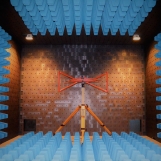Full Name: Konstantinos Thomaidis
Venue and Date: Faculty of Music, University of Oxford, Wednesday 3 April 2019
What were the main points that emerged from your interim event this year?
The theme for this day-long event was ‘Acoustic Materiality and Immateriality’ and the core reasoning for this choice was outlined in our blurb for the event: “‘Acoustic materiality’ refers to the physical activities and objects involved in sound-making. ‘Acoustic immateriality’ refers to ideas about sound, voice, and music, i.e., their existence as abstractions. What is the relationship between acoustic materiality and immateriality? The word ‘immateriality’ can also mean ‘irrelevance’. How and why have sound, voice, and music been considered relevant or irrelevant?” Apart from raising questions around ontologies and methodologies of the sonic, the chosen topic was designed to speak across and invite participation from all three disciplinary areas represented within the WG.
The event opened with a presentation by the invited keynote speaker, Professor Salomé Voegelin. The talk, drawing on her latest monograph (
The Political Possibility of Sound) and interweaving audio tracks and literary extracts with reflections on sound, defended the unfinished structure of the essay as scholarly dissemination and exegesis, juxtaposed the knowledge-making presuppositions associated with the sonic and the visual, and proposed a vertical and vertiginous engagement with what is inaudible, as distinct from—although entangled with—semantic meaning. After a Q/A and lunch, three invited PGR speakers offered 10-minute provocations to Voegelin’s talk and book. Jacob Downs (Sheffield) foregrounded the need to be more attentive to the distinction between proposing a politics of the sonic and advocating for listening as methodology and to account for recent advancements in object-oriented ontology and their implications for sound. Sophia Edlund (Exeter) examined the repercussions of sonic materiality for voice-based practice-as-research and the need to reflect on how and why certain sounds come to be considered un/attractive or ir/resistible. Ed Spencer (Oxford) enacted a complex storytelling on the premise that Voegelin occupies and performs in a fictional London Club, ‘Sonic Materiality’, and through imaginary encounters with various musicologists and sound scholars, he teased out points of contention, primarily highlighting the impossibility of neatly disentangling the semantic from the phenomenal. The final speaker, sound artist Kevin Logan, presented ‘Score for Chanting Redux’, a sonically participatory invitation to playfully engage with the notion of whistle-blowing as interruptive practice and as a potential performative link between text, reading and sound.
Throughout the day, presenters, panelists and attendees engaged in sustained debate around topics such as:
1) the potentially exclusive and excluding effect of essentialising sound and listening as the only ways into disruptive materiality and political practice;
2) lineages and schools of thought around attributes and functions of the sonic and the perils of gendering such epistemic landscapes and their attached methodologies on the basis of fixed binaries;
3) the dialogue between engaging with sonic performance merely as immediate event or phenomenon and thinking critically about context, positionality and the historicity of (and beyond) the aesthetic;
4) the interconnections between theoretical research and practice, and strategies for advancing praxical research.
We were truly pleased with the level of engagement, critical rigour and cross-disciplinary exchange facilitated by the event.The presentations and discussions highlighted the necessity for further, nuanced dialogue between areas of research, which is the very raison d’être of the new WG. The closing panel brought all attendees together into offering final provocations and sharing their current research interests and reasons for joining the WG. Areas represented were, among others: headphone immersion, electro-dance, the ageing female voice in musical theatre, the archiving of sonic artefacts in museums, sound impov and somatic dance practice, drag lipsynching, and robotic voices – a mix of interests and expertise that is promising for future interdisciplinary debate. Attendees provided positive feedback after the event. For example, Kate Dorney remarked in an email: ‘It was one of the best things I’ve ever been to in terms of balance, openness and rigorous discussion and in the consideration of practice, theory and PAR. The PG contributions were outstanding and the whole thing was really enjoyable and hugely useful’.
Types of contributions (papers, performances, workshops, etc.)
Keynote presentation, 10-minute provocations, performance talk, group debate
Number of Delegates: 17
How many were new to TaPRA? 4
Did you have any non-UK participants? Yes
Any additional points or feedback not covered above?
Overall budget awarded: £600
Amount spent: £440
Breakdown of costs:
£40 (approx.) S. Voegelin, invited speaker travel cost (return rail ticket)
£40 (approx.) K. Logan, invited artists travel cost (return rail ticket)
£50 (approx.) S. Edlund, invited PGR respondent
£50 (approx.) J. Downs, invited PGR respondent
£50 (approx.) E. Spencer, invited PGR respondent
£50 (approx.) PGR Bursary: Faye Rigopoulou
£110: Catering
Overall: £390
(the two invited speakers decided to travel on the day, therefore they did not make use of the available budget for accommodation)
(exact amount and receipts have been returned to the Secretary)

